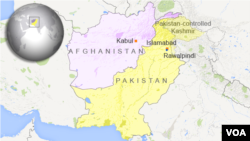The “malign influence” of Pakistan, Russia and Iran with the Taliban-led insurgency, and concerns about future political stability of the Afghan government threaten international efforts aimed at stabilizing the war-raved country, warns a top U.S. commander.
“We’re concerned about the external enablement of the insurgent or terrorist groups inside Afghanistan; in particular where they enjoy sanctuary or support from outside governments,” said General John Nicholson, leader of NATO’s Resolute Support Afghan mission.
He told reporters at the Pentagon Friday, the Haqqani Network of terrorists, which is fighting alongside the Taliban, still poses the greatest threat to Americans, coalition and Afghan partners from its sanctuary in neighboring Pakistan.
“And the Haqqanis hold five American citizens hostage right now,” Nicholson said. “I think this is worth remembering as we think about the Haqqani Network. And they remain a principal concern of ours, and they do enjoy sanctuary inside Pakistan.”
Pakistani officials, however, insist their security forces have uprooted any infrastructure Taliban insurgents and their allies were using for cross-border attacks, and extensive efforts are being undertaken to secure the porous Afghan border.
Russia, Iran
Nicholson raised concern about Taliban insurgents’ links to Russia and Iran, saying they are not advancing the cause of stability in the region.
Moscow is allegedly helping and arming the Taliban in a bid to contain the influence of Islamic State affiliates in Afghanistan and prevent it from threatening neighboring central Asian states.
Speaking at a U.N. General Assembly session late last month in New York, Russian envoy Vladimir Safronkov even called for easing U.N. sanctions on the Taliban for promoting peace talks between warring sides.
“So, Russia has overtly lent legitimacy to the Taliban,” Nicholson said.
But he dismissed assertions about the Taliban’s successes against rival IS fighters. Instead, he said, Afghan forces and the U.S. counterterrorism effort are the ones taking on and “achieving the greatest effect” against loyalists of the Middle Eastern terrorist group in Afghanistan.
“So, this public legitimacy that Russia lends to the Taliban is not based on fact, but it is used as a way to essentially undermine the Afghan government and the NATO effort and bolster the belligerents,” Nicholson added.
Iran and Taliban
The general suggested Shi’ite Iran maintains contacts and influence with the Taliban for similar reasons. He said Afghan officials have engaged both Iranian and Russian governments over the issue.
“We’re hopeful — speaking now as commander Resolute Support — that these outside actors will act in a positive way, so we can work together to help bolster the capability and legitimacy of the Afghan government, not the belligerents,” Nicholson said.
He also called for Afghan leaders to make sure their internal political rivalries do not undermine security efforts in the country.
A lack of electoral reforms, internal rivalries plaguing President Ashraf Ghani’s national unity government, growing political opposition and the recent unseating of several Afghan ministers by an increasingly assertive parliament all have fueled political uncertainty and confrontation.
“And one possible risk of Afghan political instability is a fracture, but we have not seen this happen within the security forces,” Nicholson said. He praised Afghan security forces for prevailing against the resurgent Taliban in the outgoing year and appeared upbeat about their future successes.
“You know, my message to our Afghan partners and members of the political opposition is that we respect your political process, but please don’t allow that process to undermine security gains, which have been made this year at such great cost.”





